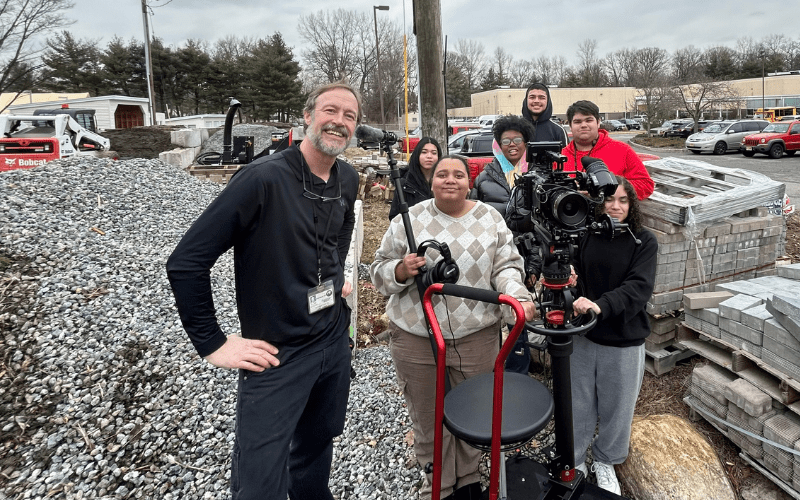
Former MLB Network videographer, producer and cinematographer Thomas Rome draws on that experience to teach students at Bergen County Technical High School. Here, Rome and his students are on a shoot outside the Environmental Design shop at their campus in Paramus.
By Jackie Burke, executive director of the NJ Council of County Vocational-Technical Schools
Hanging on the walls of the media production classroom at Bergen County Technical High School are photographs of instructor Thomas Rome capturing some of the most iconic moments – and figures – in sports. In his former roles as videographer, producer and cinematographer for the Major League Baseball Network, Rome amassed an impressive portfolio and the “street cred” required to capture the attention of teenagers.
Today, Rome recalls his past on-the-job experiences to engage students in lessons about framing shots, editing to tell a story, assisting on a media production and more. His photos are teaching aids, and they also help students connect how the skills they are learning directly apply to a career. Seeing Rome around the world, from Japan to Cuba, and at the center of a World Series is certainly inspiring – and cool – for the high schoolers.
Last year, Rome pursued an opportunity to further expose students to his former profession. He tapped into his connections at MLB Network to develop a series of real-world learning experiences, beginning with an in-class visit from MLB Network professionals. The guest speakers shared their own roles at the network and answered questions. Then, they presented Rome’s class with real MLB Network footage and challenged students to edit it into a segment tied to one of seven suggested topics.

Thomas Rome and his Bergen County Technical High School students pose on the set of MLB Central (the morning show) at MLB Network in Secaucus with on-air talent Chris Young, Lauren Shehadi, Mark DeRosa and Robert Flores.
“We were handed footage for historical segments, instructional segments for MLB’s youth-focused PLAY BALL, a highlight segment on current MLB player Anthony Rizzo and more,” explained Rome.
The students had a couple of months to pull the footage together, using what they learned in class and working under Rome’s continued direction. Then, they took a class trip to the MLB Network to deliver their finished products.
“Their stuff didn’t make the air, but it went through the rounds of approvals as if it was submitted by an editor at MLB Network; as part of that process, the students received feedback and suggested edits,” said Rome.
The students embraced the opportunity to learn by doing, and they especially loved the in-person trip to MLB Network, where they were “wowed” by the satellites, cameras and lights, as well as confirmation through the many “hellos” that “Mr. Rome” did, indeed, once work there.
Employee pipelines
Instructors like Rome, who have industry knowledge and real-world connections, contribute to the success of New Jersey’s county vocational-technical school graduates. “Many of our instructors use their contacts to put our students in the best possible place to succeed,” said Christopher Capodice Sr., vice principal of Bergen County Technical Schools – Paramus Campus.
Capodice explained, “Our instructors teach the skills they know are needed in their professions; they turnkey their knowledge and then send their students to former colleagues, where they can continue to gain experience and even a foot in the door for future employment.”
Bergen Tech runs a Work-Based Learning program to ensure every student in every career program benefits from a structured on-the-job learning experience. “We started the program about four years ago and boast a 100% placement rate with an employer for our seniors across all 11 of our high school career programs,” said Capodice. “Students benefit from learning in a real-world setting where they can apply their skills and develop the confidence to succeed.”
He added, “We have had some tremendous success stories; students who are not college bound have transitioned from Work-Based Learning to secure employment after graduation with competitive salaries, medical benefits and access to secondary education.”
Rome said he prepares students for real-world work by focusing on both the professional and technical skills needed to contribute as a production assistant. He recalled the most valuable young people at MLB Network and worked backwards to determine what to cover. Beyond technical lessons on editing and steadying a camera, he teaches how to be helpful on a job by knowing what to grab before even being asked and having batteries charged and at the ready.
His contribution to a pipeline of skilled workers is one of the many rewards of teaching, he said. He also appreciates the autonomy he has over his lessons and the predictability of the teaching schedule.
Such predictability gives him the freedom to still have a “side hustle,” but on his own terms. It also is what drove him to initially make the leap into teaching.
An attainable second career
Rome said it was actually a Connecticut School of Broadcasting ad that prompted him to further explore the idea of teaching what he knew. “The ad said, ‘Come learn from the pros,’ and I thought I could be that pro.”
Rome already had a connection to Bergen County Technical Schools through his longtime friend, Michael Miceli, who is the district supervisor of career and technical education and life sciences. His friend would turn to him to ask for his advice on audio and visual technology to purchase to ensure students learned on the same equipment used by professionals. Rome became a member of the then-Visual and Graphics Design Program Advisory Board.
When a position opened to teach that same program following its evolution from visual and graphics design to media production, Rome was the ideal candidate.
Rome completed a two-year provisional teacher program, during which he taught in the high school during the day and studied at night at William Paterson University. The process is detailed on the NJ Council of County Vocational-Technical Schools website.
Now five years into teaching, Rome is enjoying the many benefits of the profession, including having more time to spend with his family. He enjoys coaching his kids’ sports, and when he’s on the sidelines, he’s often talking more about his teaching job than his freelance work, which he continues to pursue both because of his love of showbusiness and his desire to maintain his skills. Even producing the screen imagery at a recent Weird Al show did not top his enthusiasm for his new career as a CTE teacher.
Every one of New Jersey’s 21 county vocational-technical schools needs professionals to share their industry experiences and knowledge. CTE teachers are always in high demand, especially as new programs take shape in emerging industries.
Not ready to transition into teaching just yet? Start by becoming a professional partner. Host students for Work-Based Learning or even a tour of your workplace. Learn more here.
This column originally appeared Aug. 18, 2025 in NJBIZ.



